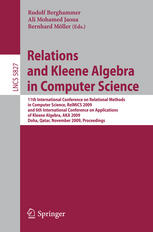

Most ebook files are in PDF format, so you can easily read them using various software such as Foxit Reader or directly on the Google Chrome browser.
Some ebook files are released by publishers in other formats such as .awz, .mobi, .epub, .fb2, etc. You may need to install specific software to read these formats on mobile/PC, such as Calibre.
Please read the tutorial at this link: https://ebookbell.com/faq
We offer FREE conversion to the popular formats you request; however, this may take some time. Therefore, right after payment, please email us, and we will try to provide the service as quickly as possible.
For some exceptional file formats or broken links (if any), please refrain from opening any disputes. Instead, email us first, and we will try to assist within a maximum of 6 hours.
EbookBell Team

4.8
84 reviewsThe book constitutes the joint refereed proceedings of the 11th International Conference on Relational Methods in Computer Science, RelMiCS 2009, and the 6th International Conference on Applications of Kleene Algebras, AKA 2009, held in Doha, Qatar in November 2009.
The 22 revised full papers presented together with 2 invited papers were carefully reviewed and selected from numerous submissions. The papers describe the calculus of relations and similar algebraic formalisms as methodological and conceptual tools with special focus on formal methods for software engineering, logics of programs and links to neighbouring disciplines. Their scope comprises relation relation algebras and Kleene algebras, related formalisms such as process algebras, fixed point calculi, idempotent semirings, quantales, allegories, dynamic algebras, cylindric algebras and their applications in areas such as verification, analysis and development of programs and algorithms relational formal methods such as B or Z, tabular methods, algebraic approaches to logics of programs, modal and dynamic logics, interval and temporal logics, algebraic semantics of programming languages , graph theory and combinatorial optimization, games, automata and language theory, mechanised and automated reasoning, decision procedures, spatio-temporal reasoning, knowledge acquisition, preference and scaling methods or information systems.